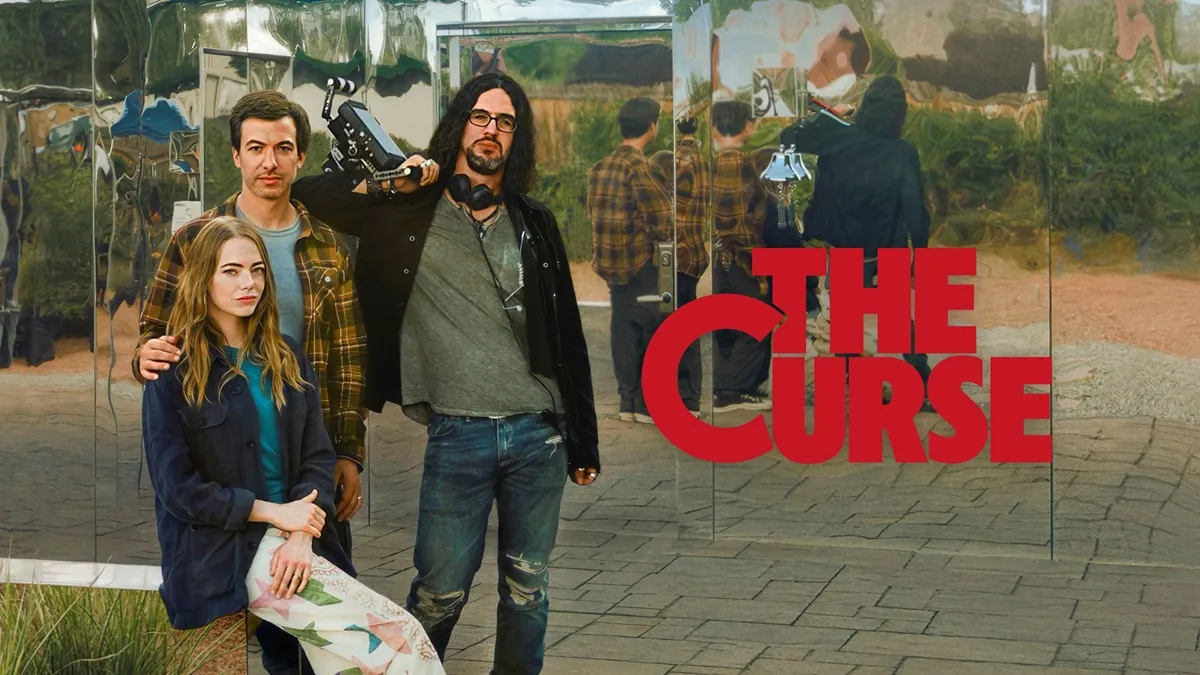While not as big as John Mulaney or Chris Rock, comedian Nathan Fielder has slowly developed a strong, loyal fanbase over the last few years. After gaining traction on the Canadian television series “This Hour Has 22 Minutes,” Nathan starred in his show “Nathan for You” where his awkward personality and particular sense of dry humor blew up. What made Nathan such a unique talent is his blending of fiction and reality, rarely breaking from his TV personality in public. Nathan leaned into this in his controversial HBO show “The Rehearsal” where the darkness of Nathan’s comedy truly began to emerge. In his latest endeavor, Nathan teamed up with acclaimed filmmaker Benny Safdie (“Uncut Gems,” “Good Time”) and Academy Award-winning actress Emma Stone (“Poor Things,” “La La Land”) to create the equally hilarious and uncomfortable series “The Curse.”
In “The Curse,” married couple Asher (Fielder) and Whitney (Stone) with the help of producer Dougie (Safdie), begin production on their new reality show in Española, New Mexico as they attempt to integrate their “eco-friendly” passive homes into the community. As problems and strange occurrences begin to arise, Asher and Whitney’s marriage becomes strained.
Something’s Always Off…
From episode one, “The Curse” establishes an abnormal tone with its unusual camerawork. Rarely is the action of the show filmed in close-ups, rather most scenes are filmed in long shots from afar as if the camera is a ghost spying on the events of the series. When these events occur in public, this filming method feels akin to that of a reality show, a connective thread to the show’s plot. But when viewing very private, personal moments with the characters, the cinematography makes these sequences feel unsettling.
Unsettling feels like the best word to describe “The Curse.” For all the laughs the show provides, there’s a constant looming dread that hangs over everything. Whether that’s because of John Medeski’s atmospheric, droning score or the show’s obsession with distorted imagery, the uncanny nature of this series is undeniable. The storyline connects to the show’s title, where a little girl “curses” Asher after he fakes a good deed. The story leaves the characters and the audience questioning if there are supernatural forces at play, adding another layer of surrealism to the story.
In its 10-episode run, the series covers a variety of subjects including gentrification, environmental awareness, reality television, modern art, and more. While “The Curse” never attempts to educate its viewers on these topics, there is clear, harsh commentary throughout. The show could be criticized for this, as it may feel at times Nathan is trying to say so much that he ends up saying nothing at all. But since the series never treats itself as anything more important than just an awkward dramedy, all the themes and “messaging” feel organic. Given the inauthenticity of the leads, as they present themselves as nature-loving, community-builders while also spending millions of dollars to become TV famous. The commentary is unavoidable, being naturally grown from the plot and characters.
Three Top-notch Performances
As for the cast, the main trio are all fantastic, playing into the absurdity of the story while also feeling real within this world. Safdie as the slimy TV producer, Dougie, is consistently the funniest character, as he puppeteers everyone around him into being his jesters while simultaneously being a capital L loser. Stone as Whitney is the hardest character to pin down, switching from seeming like the most morally good of the characters to a conniving weasel with a complete lack of empathy or care for those around her. A character as complex as this takes a skilled actress willing to give the role their all and Stone easily rises to the occasion.
Fielder as Asher not only crushes it behind the camera but also in front of it, showing a side of himself never seen before. For much of the series, Fielder plays Asher with the same personality he has on his shows “Nathan For You” and “The Rehearsal,” cringe-inducingly awkward and ignorant. But occasionally Nathan becomes a truly frightening figure with Asher becoming angry or aggressive at the characters around him. These moments are as tense as a high-speed car chase, the possibility of Asher doing something unspeakable becoming more and more real as the camera holds on his face. It could be argued that one of the greatest elements adding to the show’s often horror-like tone is Fielder’s outstanding performance.
To some, “The Curse” may feel agonizingly slow as it rarely presents much direction in its plot and spends multiple episodes meandering around seemingly random places and ideas. Because of this, it’s hard to recommend the show to just anyone. Even die-hard Fielder fans may question their enjoyment as the show’s humor is far less in your face than that of his other works. But those who are willing to drown in the uncomfortable, anxiety-inducing situations of the series will find themselves shaken in a way no other piece of fiction has ever done before. Nathan uses his years of creating shows that transcend the safety of the screen to create his best work to date: A cautionary tale like those found in “Der Struwwelpeter” about being untrue to oneself and the consequences of building upon broken relationships. “The Curse” is a masterpiece.



